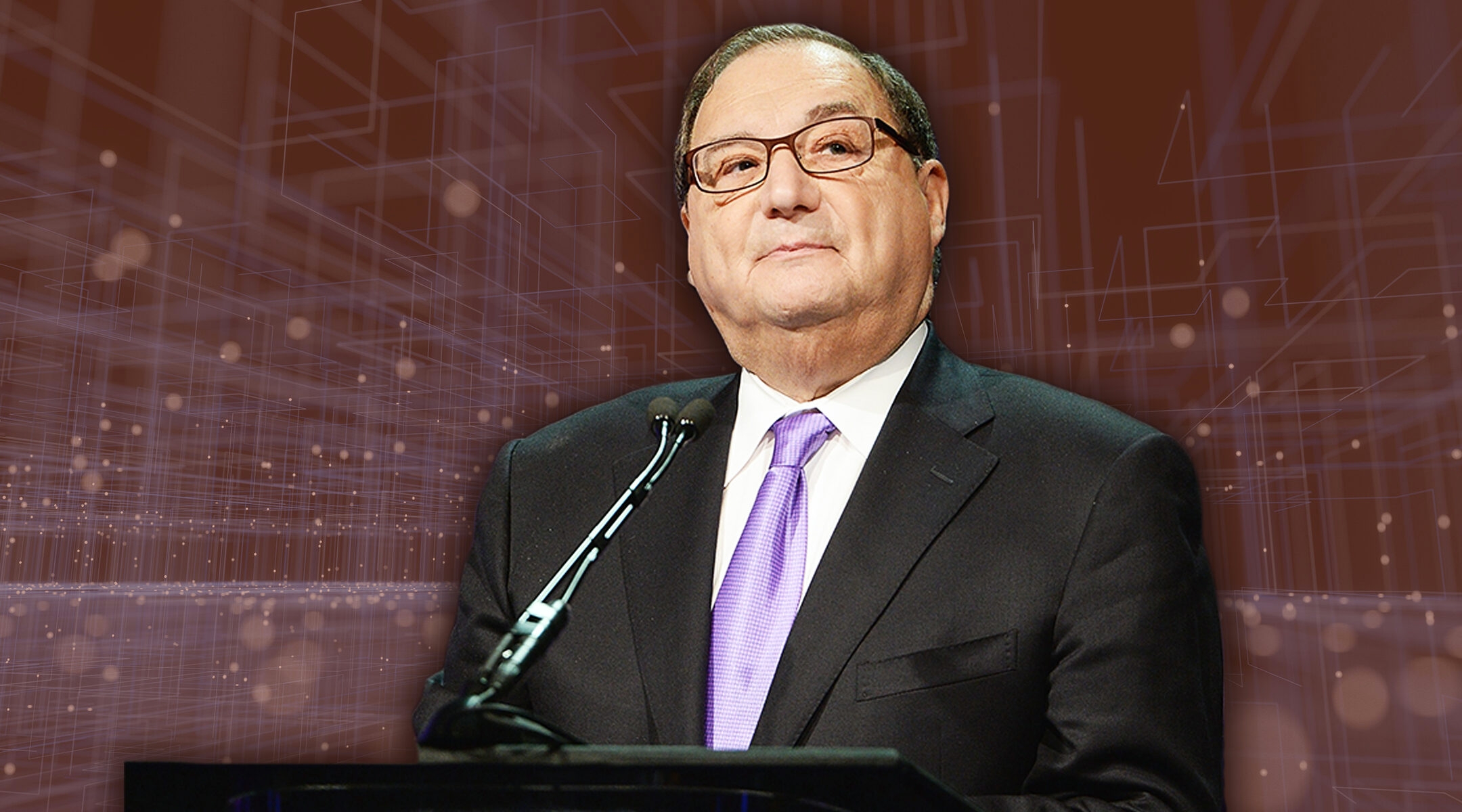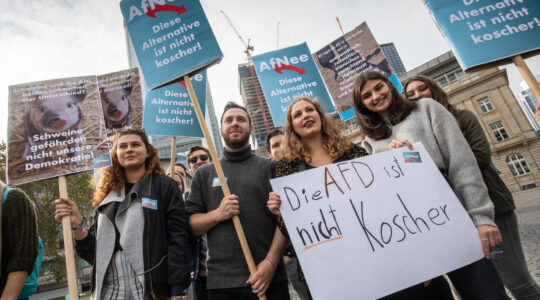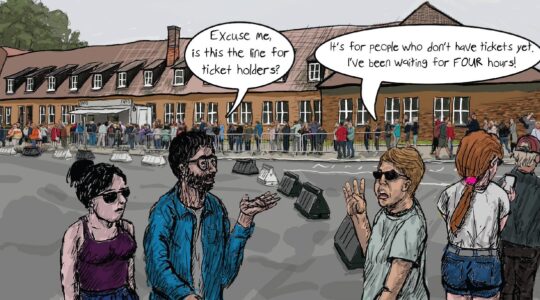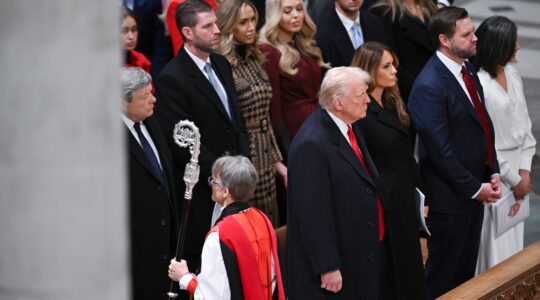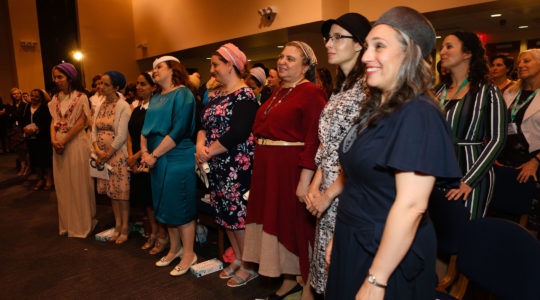(JTA) — Abe Foxman, the 80-year-old former leader of the Anti-Defamation League, shocked longtime observers in September by penning an op-ed in which he endorsed Joe Biden for president and called President Trump a threat to American democracy.
As a longtime arbiter of anti-Semitism in America, Foxman had a stake in speaking for all Jews, and had never weighed in on a presidential election in his five-decade career. His second act, a new role with a social services agency helping Jews in poverty get through the COVID-19 crisis, is also nonpartisan.
So when I spoke with Foxman in October, I was interested in understanding why he broke from his personal tradition and what he sees as the possibilities for the future for advocacy around Jewish issues in a deeply divided America.
One of the things he told me then was that he thought American Jews had not yet cultivated a vital relationship with Latino communities akin to the historic Black-Jewish alliance that characterized much of the 20th century — a point that he now says is underscored by election results indicating that Latino voters played a crucial role.
“The tentative results of yesterday’s election only underscore the importance of Latino and Hispanic votes now and certainly in the future, in Florida as well as in many other states that the Jewish community places a high priority on reaching out to and working with,” Foxman told me Wednesday morning.
“So much of the Jewish community’s advocacy work on domestic and Israel related issues depends on bipartisan support, and this election indicates how difficult it will be to achieve.”
In our October conversation, I spoke with Foxman at length about the divisions with American Jewry, how we’re letting Holocaust survivors like him down and why he’s still an optimist after so long on the front lines of fighting anti-Semitism.
This interview has been edited for length and clarity.
Is there a way to truly unite the American Jewish community on consensus issues anymore? It seems to a large extent impossible.
We’ve always had differences. We’ve always had different communities that did not work together and integrate. But we never had this polarization we have today.
Things weren’t always that wonderful between Zionists and non-Zionists. Most of the American Jewish community before 1960 or 1970 couldn’t care less about Israel. Now, we’re debating how much they care. So it’s never been perfect, but it’s never been as polarized.
We’re now struggling. What always worked to unite us, sadly enough, was a crisis.
When Israel was under attack, differences didn’t matter. And anti-Semitism used to unite us. But now, anti-Semitism is politicized and therefore polarized. So we’re losing those elements of unity which unfortunately, frequently, come from attacks from the outside.
But if, God forbid, Israel was under attack, there’s no question in my mind that the American Jewish community would come together. If you want to look at a society which is fragmented and polarized, take a look at Israel today. And yet, God forbid, when there is a threat to its existence, it comes together.
I worked for 50 years in an organization who every year would say to the American Jewish community, first and foremost, anti-Semitism is here. It’s serious. They didn’t take us seriously.
Now, there is a an awakening of realization that anti-Semitism is real — because of Pittsburgh. And then you had Poway, Jersey City, and all of a sudden the American Jewish community woke up to realize that anti-Semitism exists — but it has always existed. And to some extent, that realization was a unifying factor.
But we also need to understand that anti-Semitism is not an existential threat, and we should not fight anti-Semitism at the cost of neglecting religious, cultural and social service efforts. A hyper focus on anti-Semitism will hurt open Jewish life — synagogue attendance, Hebrew school enrollment, public displays of Jewish identity, etc. It’s imperative to have a balance.
And politics has politicized it. The Republicans say it’s the left and the Democrats say it’s the right. But anti-Semitism is in the left and in the right and threatens us from all “isms.” And yet, we’re more busy talking about who to blame rather than blaming this disease for which we have no antidote, for which we have no vaccine, which in the last 50 or so years, we’ve struggled to contain.
We know we can’t eliminate it. And so we built a firewall and all kinds of responses. That firewall is dissipating. But I still think anti-Semitism probably unifies the Jewish community more than anything else, even during this period of polarization.
It seems to me, though, that we can’t always agree on what constitutes anti-Semitism.
We’re all struggling with a definition of anti-Semitism. I think it’s helpful to have a definition, but agreeing on a definition isn’t going to prevent it. It will lessen the argument over “is it or isn’t it?” to some degree. But, you know, I used to say, if it acts like a duck and quacks like a duck, it’s a duck. Most people know what anti-Semitism is, regardless of who defines it and how it’s defined. [Editor’s note: A recent poll found that most Americans can recognize anti-Jewish bias but nearly half do not know the term “anti-Semitism.”]
That’s another element of recent times that will make it difficult in the future for our communities to come together. There was just a poll in Israel which found that two-thirds of the Israeli public believes that Trump is better for Israel than Biden. And in the U.S., you have at least two-thirds of the American Jewish community who feel the reverse, that Biden is better for Jews and Israel.
The polarization is terrible. But I’ve been an optimist all my life.
I believe we can come back to bipartisanship. I believe we can build this center again. I think we need to rebuild that firewall, which has dissipated, and it’s going to take a lot of work.
But we also live in a society today where there is very little civility. The internet destroyed privacy, and it’s on its way to destroying civility. So under those circumstances, it’s going to take a lot of work to get us together. But as I said, unfortunately or fortunately, crises do it for us.
What would that firewall look like?
Once we professionals dealing with the issue of anti-Semitism realized that there is no antidote, there is no vaccine, then how do you contain it?
There are a lot of elements to it. We did build a civil consensus that it’s un-American, immoral, unacceptable to be anti-Semitic. In American society, we built a system in which there were consequences. Yes, you could be an anti-Semite. But if you’re an anti-Semite, whether it’s in politics or entertainment, at the end of the day, you pay a price.
The fight against anti-Semitism was bipartisan. We used the media to tell the truth: anti-Semitism is the big lie. And so how do you fight the big lie? You tell the truth. We fought it through education. It’s a long-term, slow process, education, but we use the media to educate.
So that worked for us. We did legislation, we did litigation and we used the truth. We used the truth to fight the big lie.
Now, a lot of that today is done. The coalitions don’t exist like they did before. There is tribalism more today than there ever was before. There is no consensus on civility anymore. We destroyed all taboos.
It used to be that you don’t say certain things. Yeah, you’re allowed to, the First Amendment lets you say anything you want. But there was a consensus on certain taboos, and those taboos are gone.
The media is no longer the element of communicating truth. There is no truth. So even those vehicles that we used to expose the lie, to educate on the truth, are gone.
For a while, at least ideologically, we thought that the establishment of Israel would do away with anti-Semitism. Ironically, Israel’s become a platform to legitimize anti-Semitism. As someone said, Israel has become the Jew amongst the nations.
You know, what’s permitted for everyone else is not permitted for Israel.
I would even say that the memory of the Holocaust, which worked for so many years, is also gone. Look at the statistics of our new generations, how ignorant they are of Holocaust, of Auschwitz, of the 6 million. The idea that anti-Semitism can bring us to the Holocaust, for awhile, worked in terms of building this containment. But if you don’t know what the Holocaust is all about, so what?
I’m convinced we need to build a new firewall. We need to develop a whole series of containment. Hopefully we’ll get a vaccine for the coronavirus. We’re not going to get a vaccine against anti-Semitism or hate. If we did not create a vaccine after Auschwitz, after the world saw what hate did in Auschwitz, we’re not going to get one now. So we need to find other ways to deal with it.
Social media has served as a platform for a lot of really dangerous anti-Semitic tropes and misinformation. Facebook and Twitter in particular have taken a lot of heat for this. What do you make of Facebook’s recently announced policy to take down Holocaust denial posts?
I looked up my records. I wrote to Facebook in 2011 complaining about it. So, while it’s better late than never, I just really don’t understand why they had a problem with it.
What is the most recent significant change in the world of anti-Semitism? It happened half a century ago: the Vatican’s policy on nostra aetate. Throughout history, at least in modern civilization, the greatest threat to Jewish life was the anti-Semitism spewed by Christianity coming from the deicide charge.
That, for 2,000 years, was the basis for the worst of anti-Semitism. So that was the most major change in recent times, when we were “forgiven,” I guess, or whatever. So that’s a very important positive change.
The most negative change in recent years is the advent of the internet. And ironically, one would have thought that an instrument which would help spread information, knowledge and communication would be a major tool to offset lies and hate. Unfortunately, that’s not what happened.
Before I left the ADL, we commemorated 100 years of ADL. And I was frequently asked by people, if you have to give me one thing that the ADL did to fight anti-Semitism or prejudice, what would it be?
And I remember, it’s difficult, but I said, you know, the one thing that we did that probably impacted more on hate in the United States was helping pass anti-[Ku Klux Klan] mask laws. These laws say that you cannot demonstrate with your head covered. It broke the back of the Ku Klux Klan, because it forced the bigot to take responsibility for his bigotry.
And now, the internet comes 50 years later, and it puts that hood back on the bigot. Today, you can spread bigotry, anti-Semitism and falsehoods in nanoseconds globally. And we have always been No. 1 on the hit parade of bigotry — we fit all kinds of agendas.
Facebook’s new policy may stem this avalanche, this tsunami of hate. I remember going to Palo Alto and meeting with these geniuses and saying, thank you for inventing these technologies, but there are unintended consequences of your genius. And their answer to all our complaints was algorithms. Algorithms!
Well, we now know that you can fix algorithms, you can deal with algorithms, if you’re seeing it as your responsibility, you can contain it. You can. And they’re starting to do it now. Because, you know, the hurt to civility is tremendous, and to us Jews, very, very costly.
Looking back on your tenure at the ADL, is there anything you would have done differently given what you know now?
I’m not contemplating a memoir yet, so I haven’t delved into it.
There are things I would have done differently. But nothing at the moment that jumps out to say, “Wow, if only I did this things would have been different.”
A donor once said to me, if you can figure out a way to transfer or distill the love that people have for dogs as empathy to other people, you could eliminate hate and bigotry.
I struggled personally with something else. I survived because there was a Catholic woman who risked her life to save me during the Holocaust. And we were never able to distill what it was that made some people stand up and say no while most people remain silent and a percentage collaborate.
So if you ask me what I failed to do, I failed to be able to set in motion the studies and the analyses which could distill how people hate. Because at the end of the day, it’s a question of how people relate to each other.
But what is it that makes people hate, or love, or even ready to sacrifice their safety and security for somebody else?
I guess it’s an element of not finding an antidote to anti-Semitism. But if we can find those elements that make people stand up to say no, I guess that’s something that I never never got close to achieving.
You endorsed a presidential candidate for the first time this year, writing that “Trump’s presidency has given succor to bigots, supremacists, and those seeking to divide our society,” Yet you also write that Trump himself isn’t an anti-Semite. What is the practical difference?
Is he or isn’t he a racist? I don’t know. If we say he is, I don’t know what that means. So what?
You really have to look at what he does and says, and how he acts. To me, it’s an almost irrelevant question.
I also find it difficult that somebody who has Jewish grandchildren is an anti-Semite. Somebody living in New York. He may harbor all kinds of stereotypes. But I don’t know what one achieves by, you know, calling him an anti-Semite or a racist. I don’t think so.
I think he is certainly insensitive to racism, at the very least, and even anti-Semitism. I’m not sure he really understands it. But that doesn’t excuse it, because it has consequences.
His words and his actions embolden. He’s not responsible for the 200 anti-Semites that marched in Charlottesville. They were anti-Semites way before Trump. But what Trump did is he gave them a hechsher, or at least they believed that there was a hechsher now, in American society to march and say, “I am an anti-Semite.” So while he’s not responsible, he has to take responsibility for it.
His words and his actions were interpreted by others that today, anti-Semitism is permissible. Which is, you know, serious in itself. For 50 years, I tried to walk that center as a Jewish professional. Trump has done good things for Israel. But you don’t know where he’s gonna be tomorrow. On any issue. Because there’s no dependability, no credibility, no rationality, no reasonableness. That is certainly not good for democracy — and from my perspective, certainly not good for Jews or Israel.
And so I thought, you know, I heard the arguments and how difficult they are. And it’s not simple. It’s not a simple decision for the American Jewish community.
But to me, I thought I had a very clear, moral imperative to get up there and say, “You know what? He’s not good for democracy, and therefore not good for Jews.”
I think some Jews on the right have seen factions within the Democratic Party as uniquely critical of Israel or as veering into anti-Semitic territory. Do you have any concerns about…
Yeah, I do have a concern. I do.
I’m old enough to remember when there was an anti-Semitism problem in the Republican Party. And I am old enough to remember how bad the Republican Party was on Israel. It’s changed.
There have always been elements that were not good for Israel. But that didn’t mean that was the Republican Party for then and forever.
We’ve also had issues in the Democratic Party. It’s never been perfect.
Yeah, I am concerned. But even though I’m concerned about what The Squad have said, and have not retracted, they are not the Democratic Party. To the same extent that the bigots in the Republican Party are not the Republican Party.
But it’s a question of proportion. Yes, there is a problem in the Democratic Party. But the leadership of the party, to the best of my knowledge, and all the years that I’ve known them, are reasonable, rational, anti-bigots and anti anti-Semites. I am comfortable that they will stand up.
Is it growing? Yeah, the more crises we have — the economic crisis, social crises — the more the extremes will act up and will find a voice on both sides.
I don’t ignore the efforts on the extreme left which have anti-Semitic and anti-Israel elements. But while I think we need to look at it, I don’t think they’re comparable to the Charlottesville situation. I don’t think they’re comparable to the right-wing hate.
One of the ADL’s most successful legislations that we advocated for and wrote was anti-militia legislation.
There is a serious issue in this country of right-wing militias. And the right wing has its anti-Semitic elements, which have acted out, which have cost Jewish lives.
We should be concerned about the left. But I don’t think it’s comparable.
I think we should raise our voice. I think we should be concerned by The Squad, absolutely. But I don’t think they’re controlling the party.
I wasn’t happy with some of the positions that Bernie Sanders took. But the fact is, Bernie Sanders is not the Democratic Party. And Donald Trump is today, for better and for worse, the Republican Party. His image, his rhetoric, his value system, his views on immigration, his views on respect for others, are an anathema to Jewish values, Jewish concerns and Jewish security.
I think many on the left would argue that the best response is building coalitions with other minority communities. The ADL was long seen as a leader in Black-Jewish alliances, but I’m not sure that’s true today. What shifted in the relationship between the Black and Jewish communities such that these coalitions are not as central to a lot of organizations’ work — including the ADL’s — as combating extremism has become?
I guess the simple answer is tribalism. We’ve moved from an era of building bridges and building coalitions to more of everybody for themselves.
Politicization also makes it very, very difficult to build coalitions. Because it’s either you’re my friend or you’re my enemy, and there’s nothing in between. There is no effort out there in bipartisanship anywhere.
Black Lives Matter became a vehicle for coming together. But first, they had to remove the anti-Israel agenda item. Which finally they did. But things like that, if they’re not politicized on certain issues which are hurtful to elements of the partnership, can work.
I would put a high priority on building relationships with the Latino community, which 20 years from now will be the most significant element in our society that will determine state-church issues and foreign aid. So there needs to be a major effort to build understanding and support.
We have history with the African American community. We have good episodes and bad episodes. It’s not perfect. But we marched together. And we stood together.
So even at this moment, it may not be as productive, but it’s there. We don’t have relationships with the Latino and Hispanic communities. And they are the future of this country — which is what frightens Trump. We need to build the relationships, build the support and build the communications.
A campaign recently criticized the ADL’s collaboration with police departments. Obviously, Jewish institutions rely on law enforcement as critical partners, but I’m not sure people in other marginalized communities have the same opportunity to see the police as such deep protectors. So how can American Jews balance an appreciation for this relationship with legitimate concerns about policing?
If I write my memoir, one of the proudest achievements of my 50 years at the ADL is the issue of law enforcement’s relationship with Israel.
We were the first, and we did it for two reasons. We did it first and foremost because of wanting to have a sensitivity in the law enforcement community that Israel can make a contribution to safety and security on American streets.
And so that was the altruistic view, if you want. The selfish view was that we believed that bringing police officers to Israel would also give them a greater sensitivity to Jews and Jewish life. And therefore, they’d be more sensitive on the American scene to the Jewish community.
But the number one element was a desire to share the techniques that Israel had to develop because of life and death issues every single day in the streets, and bring it to America.
Historically, the police were not Jewish friends. They were not our allies. Whether it was in Minsk or in Istanbul, or Rome, or wherever, historically, the police were the enemy of the Jewish people. They lined up with the nobles with the princes with the kings, with the popes who preached and enacted anti-Semitism.
Ironically and pleasantly in this country, the police were not our enemy; police were our friends and protectors. That was part of the reasoning to develop programs of understanding.
But it causes a problem. Because they may not be friends and protectors for everybody.
So we have to find a balance. I think the charges against the ADL are your classic anti-Semitic charges that American Jews brought to the police to train them in Israel on how to oppress minorities.
These are emotional issues. Because the American police are our friends, and yet they’re not necessarily the friends of our other friends.
Nothing in life is simple. You know that. You write about it every day.
You recently partnered with the Met Council to raise funds to feed Holocaust survivors in poverty during the pandemic. Why did you choose this as a return-from-retirement effort?
There’s this enigma about Holocaust survivors: We talk about them, we honor them, but somehow we failed to take care of them. I fail to understand why this is not and has not been a priority for the Jewish community.
In Israel, they were the backbone of building the state. And now, I watch Israeli television, and once a week, you see the tragedy and trauma of them being neglected.
There’s a lot of things we can’t take care of for survivors. We can’t heal their pain. But we certainly can make sure that they’re never hungry again. It’s not such a difficult thing.
Another pandemic-era challenge in the Jewish community has been protests against restrictions in Orthodox areas of New York City, which has also experienced a recent rise in violent anti-Semitism. What do you make of what’s happening?
I think COVID is going to change a lot of things forever. We’re still in the midst of it, so we really don’t know. But we’re seeing some fragmentation in our community. And the Haredi, non-Haredi divide has been exacerbated by COVID.
In Israel, the Haredi community is almost a state within a state. It’s always been an issue in Israel, because of poverty, because Haredim don’t serve in the army, because of the political forces. But today, it’s almost a community at war with the state, because of COVID. I just saw on Israeli TV an hour ago police coming in to break up an Orthodox wedding.
It’s happening there and it’s happening here.
There are all kinds of mixed feelings about how other Jews relate to the Orthodox community. But this all of a sudden, on one hand, embarrasses them, and on the other hand, causes concern about what the impact may be on anti-Semitism, which doesn’t distinguish between a Haredi Jew and a non-Haredi Jew.
There are also recent economic issues in terms of community growth, and therefore replacing other communities, which push on all kinds of social sensitivities and which also may wind up in raising the level of anti-Semitism.
And yet, Orthodox Jews have a right to live where they want and worship when they want, like anybody else. So it is bringing to the fore a social issue which needs very much attention, but also may provide – although I would say anti-Semitism doesn’t need excuses — but may provide another excuse for anti-Semitism.
You’ve shared elsewhere that you’re not convinced that younger American Jews are less connected to Jewish life, as some fear. What do you think about when you contemplate the American Jewish future?
I remember when American Jews couldn’t care less at all about Israel. In the same sense, I remember when America didn’t support Israel, whether it was Democratic or Republican.
Now, what are we debating? The fact that there is a debate and a discussion? The best strategy? There are more pro-Israel organizations today in the United States, of all shapes and variations, then there ever were in American Jewish history. I remember when there were a handful. Today, you have hundreds.
The money is passing through to the younger generation. And they do care. We’ve always complained that American Jews cared more about universities and museums than they cared about Jewish life. And yet, Jewish life is thriving.
We’re struggling with what kind of synagogues, what is Jewish. I find a dynamism within the community which is exciting.
The coronavirus is hurting Jewish institutions. And yet look at the creativity, look at the initiative. Look at the sprawling effort to continue to our values, our traditions and our customs. It’s magnificent.
So again, it all depends on your perspective. Is your glass half full or half empty.
All my life I’ve been an optimist. And I saw, pardon me, more shit than you can imagine [as a child during the Holocaust]. Okay? More terrible things than you can dream about.
But I’ve always been an optimist. And I continue to be an optimist.
I’m glad that there are critics that are griping and complaining, because that only helps others to step up to the plate.
There are more institutions today than we could have ever ever imagined. There are more people struggling with how to be a Jew, how to act as a Jew, what does it mean to be a Jew, than ever, ever before.
The one thing I am worried about is the relationship between American Jews and Israeli Jews. Because we’re very very critical to each other. They need us, because we are the cement to the relationship between the governments and between the two countries, They are, if you will, our insurance policy. As long as anti-Semitism exists, Israel is the insurance policy for Jews throughout the world.
That relationship is so important. And I worry about it being politicized and polarized. Because we need each other for our future. And we need to be able to invest in it, in Jewish education, in each other. And I’m still an optimist.
What is the biggest thing right now that’s giving you optimism? I think you’re one of the few people finding optimism right now.
Golda Meir once said that Jews don’t have the luxury of being pessimists.
Everybody’s view of whether they see their life or their future optimistically is very personal.
I survived the Holocaust as a child, when a million and a half Jewish children perished because of their being Jewish. How dare I be pessimistic about the future of Jewish life?
We have a state. We have a Jewish community in America unlike any in its history.
Fine, I’m worried about European Jewry, I’m worried about Latin American Jewry. But with the two largest communities in the world, Israel and the United States, with all the problems, with all the challenges, we survived. And we will continue to survive.
Israel, with all of its problems, look how strong it is. Look how credible it is in terms of its science, its medicine, its creativity. Even now on television and movies. I remember when you couldn’t get a phone in Israel.
So wow. How can you not be optimistic?
JTA has documented Jewish history in real-time for over a century. Keep our journalism strong by joining us in supporting independent, award-winning reporting.
